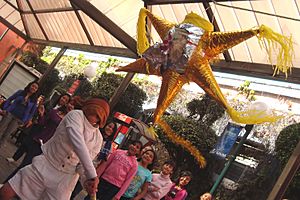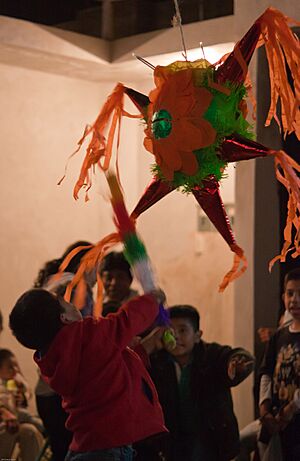Las Posadas facts for kids

Las Posadas is a special nine-day celebration. It is mostly celebrated in countries like Mexico, Guatemala, El Salvador, and Honduras. Many Hispanic and Latino Americans in the United States also celebrate it. This tradition usually takes place every year from December 16 to December 24. These countries have kept the holiday alive with very few changes over time.
Contents
What is Las Posadas?
Las Posadas is a religious festival that means "The Inns" or "The Lodgings" in Spanish. It remembers the journey of Mary and Joseph as they looked for a place to stay in Bethlehem. They were searching for an inn before Jesus Christ was born. The celebration lasts for nine days, which represents the nine months Mary was pregnant.
Where Does the Name "Posadas" Come From?
The name Las Posadas comes from the Spanish word posada. This word means "lodging" or "accommodation." In this celebration, it refers to the inn from the Nativity story. The celebration uses the plural form because it lasts for nine days. This nine-day period is called a novena. It happens during the Christmas season.
The Story Behind Las Posadas

This celebration has been a Mexican tradition for over 430 years. It began in 1586. Many Mexican holidays include plays that show original events. This tradition comes from old plays used to teach religious stories. These plays helped people learn, especially when many could not read.
How Did Las Posadas Begin in Mexico?
The origins of Las Posadas are linked to the Augustinian friars in Mexico. In 1586, Friar Diego de Soria received permission from Pope Sixtus V. This allowed special Christmas masses to be held from December 16 to 24. This practice started in churches. Later, it spread to large estates and private homes. By the 1800s, it had become the modern celebration we know today.
In Mexico, the winter solstice was a very important festival. It happened around December 12. The Aztec calendar celebrated Tonantzin, the mother of the gods, around this time. Their main sun god, Huitzilopochtli, was also born in December. Spanish missionaries saw how these native celebrations matched the timing of Christmas. They used this chance to share the story of Jesus' birth. They brought the religious play to Mexico. In 1586, Friar Diego de Soria got official approval from Pope Sixtus V. This meant a Christmas mass should be held across Mexico for the nine days before Christmas Day.
While Las Posadas has roots in Catholicism, many Protestant Latinos also take part in this tradition.
How People Celebrate Las Posadas Today
The celebration often involves a re-enactment of Mary and Joseph's journey. Two people dress up as Mary and Joseph. Certain homes are chosen to be "inns." The group walks in a procession, often carrying a candle.
The Procession and Songs
The actors go to one house each night for nine nights. At each house, the residents sing a song in response. Then, Mary and Joseph are welcomed inside. The group of guests enters the home. They kneel around a Nativity scene to pray, often saying the Rosary. The final stop might be a church instead of a home.
Sometimes, people play the parts of Mary and Joseph. Mary might even ride a real donkey! Others, like angels and shepherds, might join the procession. Some pilgrims carry images of Mary and Joseph. Children often carry poinsettias. Musicians follow the procession, and everyone sings special Posadas songs.
Piñatas and Feasts
At the end of each night, people sing Christmas carols. Children get to break open star-shaped piñatas. After that, everyone enjoys a feast together. The piñatas used during this holiday are traditionally made from clay.
Las Posadas Around the World
Las Posadas is celebrated in different ways in various places.
In Portland, Oregon, one event ends with Santa Claus. Christmas gifts are given to children in need.
A large procession has taken place since 1966 along the San Antonio River Walk in San Antonio, Texas. It passes by famous places like the Arneson River Theater and the Spanish Governor's Palace. The procession finishes at the Cathedral of San Fernando.
In the Philippines, a similar tradition is called the Panunulúyan. This play sometimes happens right before the Misa de Gallo (Midnight Mass). Other times, it is performed on each of the nine nights. A key difference is that actors play Mary and Joseph, not statues. They sing their requests for a place to stay. The "innkeepers" also often sing their replies. Another difference is that the songs are in a Philippine language, not Spanish.
In Colombia, Venezuela, and Ecuador, families and friends gather. From December 16 to December 24, they pray the Novena de Aguinaldos. This is a special nine-day prayer.
See also
 In Spanish: Las Posadas para niños
In Spanish: Las Posadas para niños
 | Claudette Colvin |
 | Myrlie Evers-Williams |
 | Alberta Odell Jones |

